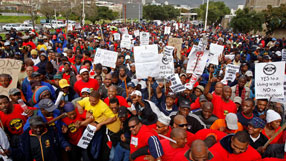Strikes and protests threaten World Cup
JOHANNESBURG - A crippling rail and port strike, which affected South African exports, may end by Friday but a strike at utility Eskom next week could disrupt power supplies just three weeks before the World Cup.

The near two-week strike at rail and logistics group Transnet curtailed exports of metals, cars, wine and fruit to Asia and Europe and football body FIFA said imports of some equipment for the sporting event were also affected.
South Africa's biggest union, The National Union of Mineworkers (NUM), said its members at state-owned power utility Eskom will strike from May 26 over a pay dispute.
South Africa is preparing to host the month-long World Cup which starts on June 11 and economists and analysts have criticised the unions for using the competition to push for wage hikes way above inflation of 5.1 percent and other demands.
The NUM called off a similar strike last year after reaching agreement with Eskom but revived the strike after the company failed to implement certain parts of the deal.
Eskom has said it had contingency plans in place to ensure power supply, but with South Africa approaching the winter months when electricity demand peaks, a prolonged labour action could lead to blackouts.
South Africa suffered a serious power crisis in 2008, the result of years of neglect of electricity generation capacity, which cut output in industry and the key mining sector for days.
The country's powerful labour federation COSATU has also threatened to strike over hefty electricity price increases during the World Cup.
Get FourFourTwo Newsletter
The best features, fun and footballing quizzes, straight to your inbox every week.
COSATU opposes a 25 percent increase in electricity prices granted to Eskom. The labour federation says the increase and two similar increases over the next two years will have a crippling effect on the poor and lead to further job losses.
PROTESTS
Since the start of the year, there has been an upsurge in protests in black townships and shantytowns where poor residents are angry over the government's failure to provide housing, jobs and basic services such as electricity and water.
In the first quarter of 2010 there were 54 major such protests compared to 109 last year, according to Municipal IQ, a local government monitoring service.
The often-violent protests have produced images reminiscint of the apartheid era with police using force to break them up. They have erupted around the country and police have said they are prepared for any such protests during the World Cup.
UNREST
The Consortium for Refugees and Migrants in South Africa (Cormsa), a grouping of human rights and migrants organisations including Amnesty International and the South African Red Cross, warned last week that attacks against foreign migrants could flare up again.
A wave of xenophobic attacks two years ago saw at least 62 people killed and over a 100,000 foreign migrants displaced.
Cormsa said at least 10 incidents of violence against foreigners have taken place since the start of the year.
The xenophobic attacks in 2008 were only brought to an end after massive intervention by police and the army.
